Ten years ago all electric vehicles like the EV1, EV Plus, RAV4 EV, and others were relegated to the back burner when the automakers successfully fought the CARB ZEV mandate, and got CARB redirected to support hydrogen fuel cell research while the automakers went full bore into SUV sales. Some game changing events occurred a few years ago changing the direction of the automakers enough that there are now several electric vehicles on the market, in mass production by major automakers, on sale around the world. One significant event was the development of Plug-in Prius conversion kits by activists who launched a cottage industry of Prius conversions, keeping the "plug-in vehicle" on the table. The second, and more important, was the rise of Tesla Motors and the success of the Tesla Roadster. Because the success of Tesla made the major automakers EV programs look so bad, the company is credited with having given justification for major automakers to re-enter the electric vehicle market. Tesla Motors, with the Model S/X, appears poised to revolutionize the auto industry, again.
One may look at the total sales of Tesla Roadsters, 2500, and curiously ask how that can be called a success. That car competed in a narrow niche market of upscale high end sports cars, where 2500 sales is a significant number. Especially for an expensive electric car.
Those 2500 Tesla Roadsters were, according to Revenge of the Electric Car, what enabled Bob Lutz (then Vice-Chairman of General Motors) and Carlos Gohsn (CEO of Nissan/Renault) to re-awaken electric vehicle programs within their own companies. It's not just GM and Nissan, but Ford, Daimler, BMW and others, who re-awoke their sleeping EV programs when the Roadster came on the scene. To be fair it wasn't just the rise of Tesla Motors, because there's also rising concern over environmental pollution, greenhouse gases, and oil supply crunches, that are causing governments around the world to change the regulations to favor efficiency and a move away from fossil fuels.
Tesla's role in this is to design and manufacture no-compromise all electric vehicles, ones that demonstrate electric vehicles can be fun, beautiful, and powerful. Tesla's founders knew the Roadster would have to blow up and demolish the negative stereotypes around electric vehicles, that they can only be slow boring ugly golf carts. To do so the Roadster was designed with top end acceleration and top speed, built on a chassis provided by Lotus Engineering, and equipped with a huge battery pack allowing way more electric driving than is rationally needed.
The company is continuing, with the Model S/X, the same line of thinking, but taking it to the next level. Where the Roadster had a 240 mile electric driving range, the Model S/X has a 300 mile electric driving range. Where the Roadster had a 16.8 kilowatt charging system for relatively fast recharging, the Model S/X has a 90 kilowatt charging system providing 160 miles of driving range in a half hour. Where the Roadster has a 0-60 time under 4 seconds, the Roadster isn't quite that fast, but offers three rows of seating, and enormous cargo capacity between the rear and front trunks. Where the Roadster sold 2500 total cars, and was based on another manufacturers chassis, the Model S/X will sell twice that number this year alone, and is a ground-up design developed by Tesla engineers.
The Model S/X more effectively snubs the noses of the major automakers than the Roadster did. Where electric cars from the major automakers have a 100ish mile range, the Model S/X have a 300 mile range. Where the main electric cars (Leaf, Volt, i-Miev, Focus Electric) have 3.3 or 6.6 kilowatt charging, the Model S/X has 10 or 20 kilowatt charging, and it is high speed charging that governs the total daily driving range of an electric car.
To the extent that the Tesla Roadster pushed the auto industry back to electric vehicles, one wonders what the effect of the Model S/X will be in a few years. The capabilities of the Model S/X are way beyond what the major automakers are offering. If Elon Musk is to be believed, that Tesla has orders on hand for 10,000+ Model S's, and projects sales of 10-25,000 Model S's by the end of 2013, the company could be single handedly responsible for a large percentage of all electric vehicles on the road. That is, at a minimum Tesla has orders in hand, right now, for 10,000 Model S's, and the company's official projection is 25,000 Model S's sold by the end of 2013, along with several thousand Model X's. If this scenario pans out, it could keep Tesla Motors in the leading position in the electric automobile industry.
As if smashing the slow-boring-ugly-golf-cart stereotype is not enough, the company appears poised to take on another negative stereotype of electric vehicles, the long tail pipe idea behind the negative image of coal-powered electric vehicles. As we reported last week, Elon Musk spoke at last weeks Tesla Motors shareholders meeting about integrating solar power with the supercharger system the company plans to deploy for Model S/X owners. Musk said "We have to solve sustainable power generation as well, and solar is the best way to do that. If we have sustainable power generation, and sustainable power consumption, then we really have solved the problem." For him to say this is not just idle speculation, because he is the Chairman of not only Tesla Motors, but Solar City, one of the largest solar power system installers in the country, putting in his hands the corporate assets to make that dream become reality.
The typical conversation around electric cars is to complain that 100 miles driving range is not enough, or otherwise invoke "range anxiety", and to ask "when will they make an electric car with longer range?" The answer to that request is not coming from the major automakers, but from Tesla Motors. The Model S/X will prove, again, that electric cars with long driving range are quite possible, and that there's no magic, just the willingness to spend enough to buy a large battery pack.
In short, because Tesla Motors has always and will continue to build no-compromise electric cars, the company continually disproves conventional wisdom. Tesla's very existence poses a question to the automakers: "if Tesla can do this, why can't you"?
Set Torque News as Preferred Source on Google






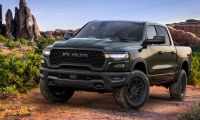
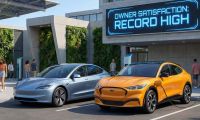
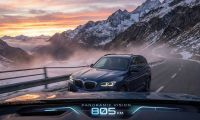
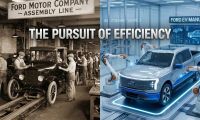
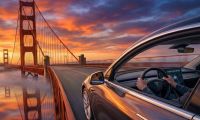
Comments
Rather than inspire change in
Permalink
Rather than inspire change in the other automakers, I think their opportunity this time around is to simply become a major automaker. In a sense, it becomes "who cares how the rest of the industry responds?" Tesla could simply walk in and start taking meaningful market share in other 4 years in the luxury segment, and in 10 years in the broader market.
Excellent analysis. Electric
Permalink
Excellent analysis. Electric Cars + Solar Garages = Green Streets.
Moreover, automotive battery technology is about to take a quantum leap as firms all over the country vie to combine different elements from the two sides of the atomic chart and mix them with nano-technology to greatly enhance the efficiency and reduce the weight of batteries.
A representative of Denver Electric Vehicles stated we could be building electric cars with a range of 2500 miles between charges very soon, just two weeks ago at the Denver Ford Focus Electric intro. Another researcher from Motion Dynamics suggested the research into automotive batteries could result in realizing the long elusive trick of creating cold fusion.
I agree, the Model S sedan
Permalink
I agree, the Model S sedan and the Crossover X are really a thumb nose at those hesitating giant carmakers who still drag their feet to the EV scene. I think the better questions is when will Tesla not revolutionize the car industry, again? But that will open up a whole new can of worms and naysayers will get their panties in a knot again.
IN my opinion, the super
Permalink
IN my opinion, the super battery from WSU will come to pass, and soon. After that, ALL future vehicles will be electric and Tesla will have a head start.
Energy has driven the world
Permalink
Energy has driven the world for over a thousand years Wind, Hydro and Solar are the oldest forms of energy giving power to all smart enough to use it.
In the last 200 years Coal, Oil and Nuclear has given energy to many worldwide and great power and wealth to only a few. At the cost of many lives in coal Mines, Oil Spills, Radiation, Cancer and Polluting the Air and Water on all of the Earth.
Unfortunately for the wicked there is not an unlimited amount of oil on earth. Just the same as the Forest Trees that clean the air and make Oxygen we breath and all living on earth need to Live. As some in denial are not able to recognize or ever see or live with blinders on.
Doctors and Drug ceo's have been making millions prescribing drugs to many that live near or by High polluted areas that hurt breathing our lungs and harm our children and all. That we all pay for. When all they need is Clean Air and Water, and Clean Cities.
Now common sense would be for all to look for a clean fuel Wind, Hydro, Geothermal and Solar. Renewable Energy is eliminating the need for Dirty Energy Worldwide at a record pace. With Solar Energy Clearly the front runner.
To the fear of some of the richest people on Earth. They to surprisingly are doing
something extraordinary investing in Solar Energy. After years of many of them trying to under mine it.
Fuel that makes energy to ship goods, or make electric for homes and manufacturing. Can transform whole nations into prosperity and wealth or poverty and economic hardships for most all. Just as taxes on taxpayers has done. For over two thousand years. Making slaves of many to the wicked and unjust few. History Lesson Roman Empire, Persian Empire now OIL Empire oh sorry OPEC.
The Freedom to get your own Power from the Wind and Sun, Solar Energy has been there for years. Are Libraries and Schools should have been the first to have gone Solar and Renewable Energy. And why are they not? Churches are all over the Planet. They are going to Solar Energy.
Thank GOD for the Pioneers like John Schaeffer that Started Real Goods The first and Best catalog for Renewable Energy and Scientist Bill Young at the FSEC Florida Solar Energy Center and Monica D. Key Lindbergh for many years wrote to legislators promoting Solar and Renewable Energy and many others.
These Pioneers helped put Wind, Solar And Renewable Energy in the Spotlight for all the World to see. One of The Greatest Scientists ever Albert Einstein Stared it with a Dream that the day would come that all the World would use Solar Energy. His many years of work with the law of the "Photoelectric Effect", and showing this to the World won him the Nobel Prize in Physics. For the "Photoelectric Effect"
Free Energy From the SUN in the heavens above.
We still do not teach this to our young.
Very soon Hybrid Vehicles and (EV's) Electric Vehicles will out number the ones that need oil and gas to go. With the ability to recharge them at home and work from the sun.
Tesla Motors with its new Model S electric sedan, will be one of many the World will see soon. Honda, Nissan, Audi,VW, BMW and Volvo are just some of the Car Companies putting into production Electric Vehicles a EV, and many more are and many are building Electric / Hybrid Vehicles. The DeLorean Motor Company will be putting into production by 2013 a DMC-EV Electric DeLorean, that will have a body and power plant that will last you a life time. Just think you can recharge them at home and work free from the sun Solar Energy.
The Lord's Little Helper
Paul Felix Schott
Now to own a car that will never rust way and runs on the power from the sun that's the one for me.